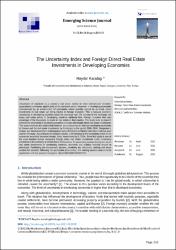| dc.contributor.author | Karadağ, Haydar | |
| dc.date.accessioned | 2022-12-06T11:12:22Z | |
| dc.date.available | 2022-12-06T11:12:22Z | |
| dc.date.issued | 2021 | en_US |
| dc.identifier.citation | Karadag, H. (2021). The uncertainty index and foreign direct real estate investments in developing economies. Emerging Science Journal, 5(4), 512-520. http://doi.org/10.28991/esj-2021-01293 | en_US |
| dc.identifier.issn | 2610-9182 | |
| dc.identifier.uri | http://doi.org/10.28991/esj-2021-01293 | |
| dc.identifier.uri | https://hdl.handle.net/11436/7224 | |
| dc.description.abstract | Attainment of standards in a country’s real estate market to meet international investors’ expectations contributes significantly to the real estate sector. However, in developing economies characterized by an environment of uncertainty where stability cannot be achieved, direct investments in real estate can bring returns to foreign investors. This is because economic uncertainty in developing countries raises the exchange rate. An increase in the exchange rate keeps real estate prices in developing countries relatively low. Foreign investors then take advantage of the low prices to invest in real estate in that country. The study aims to research whether the uncertainty in developing countries increases the foreign direct real estate investments. The study examines the relationship between the uncertainties in selected developing economies in Europe and the real estate investments by foreigners in the period 2008–2018. Gengenbach, Urbain, and Westerlund Panel Cointegration test and PDOLS coefficient estimation methods were used in the study. According to the analysis results, a 1% increase in the uncertainty index in the economies examined increases foreign direct investments by 5.731%. Since this study is one of the most detailed studies measuring foreign direct real estate investments under uncertainty conditions in the economy, it contributes to the literature. To sustainably increase foreigners’ direct real estate investments in developing countries, economic and political stability should be prioritized. Facilitating the bureaucratic process, providing tax reductions, making real estate suitable for demand, following the appropriate price policy, and making various environmental regulations will also increase foreigners’ direct real estate investments. © 2021 by the authors. Licensee ESJ, Italy. | en_US |
| dc.language.iso | eng | en_US |
| dc.publisher | Ital Publication | en_US |
| dc.rights | info:eu-repo/semantics/openAccess | en_US |
| dc.subject | Developing economies | en_US |
| dc.subject | Foreign direct real estate investment | en_US |
| dc.subject | PDOLS coefficient estimate method | en_US |
| dc.subject | Uncertainty index | en_US |
| dc.title | The uncertainty index and foreign direct real estate investments in developing economies | en_US |
| dc.type | article | en_US |
| dc.contributor.department | RTEÜ, İktisadi ve İdari Bilimler Fakültesi, İktisat Bölümü | en_US |
| dc.contributor.institutionauthor | Karadağ, Haydar | |
| dc.identifier.doi | 10.28991/esj-2021-01293 | en_US |
| dc.identifier.volume | 5 | en_US |
| dc.identifier.issue | 4 | en_US |
| dc.identifier.startpage | 512 | en_US |
| dc.identifier.endpage | 520 | en_US |
| dc.relation.journal | Emerging Science Journal | en_US |
| dc.relation.publicationcategory | Makale - Uluslararası Hakemli Dergi - Kurum Öğretim Elemanı | en_US |


















